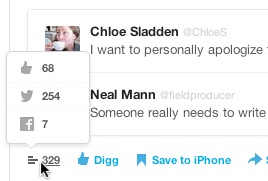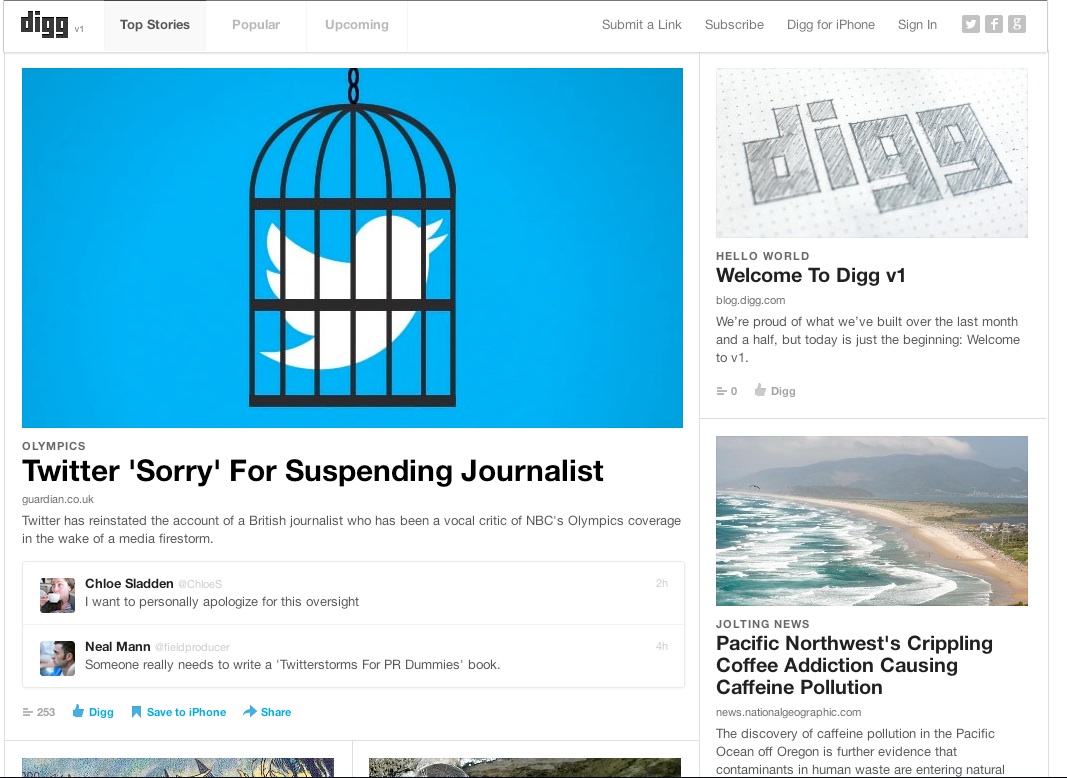After just six weeks of hard work, Digg‘s new owners at Betaworks just flipped the switch and re-launched the site. The new Digg was originally scheduled to launch tomorrow, but despite the tight deadline, the Digg team managed to get this completely rewritten version of the site out ahead of schedule. As promised, the new version of Digg puts a strong emphasis on images and is currently free of ads. With this relaunch, Digg is also shipping a new iPhone app and mobile web app.
Why Relaunch In Just 6 Weeks? Old Digg Was Too Expensive To Run
Over the last few days, the Digg team already provided a few sneak peeks into the thought process that went into redesigning the site. Earlier today, I talked to Digg’s new CEO John Borthwick who seemed genuinely surprised how much interest there still was in Digg. During our interview, he told me that one of the reasons why the team wanted to rebuild Digg as fast as it could was the simple fact that Digg’s old infrastructure was very expensive to run. According to Borthwick, it would have cost “hundreds of thousands per month” to keep the site running on its old platform. Even though the site was state-of-the-art just a few years ago, most of the infrastructure would be considered legacy technology by a modern startup. Because of this, the new Digg team decided to throw away virtually all of the old underpinning of the site in favor of a fresh start. Borthwick wants to rebuild the company and to do so, he says, it’s important to turn it back into startup mode and develop a completely new and modern platform to develop the new Digg on.
Digg + Facebook + Twitter
This means that all of Digg’s voting algorithms are gone, too, but Borthwick said that users will be able to use their old Facebook-based Digg accounts on the new site and will be able to get back most of the data they put into Digg in its earlier incarnations in the near future. Just like in the last version of Digg, users will use Facebook to sign in to the site and vote. This Facebook integration also means that users’ diggs will be posted on their Facebook timelines, by the way.
Digg’s new algorithms now also look at signals from Twitter and Facebook. The team, however, stresses that it cares “first and foremost about what Digg users have to say — measured, as always, in diggs.” Similar to Techmeme‘s “tip @techmeme” system on Twitter, users can also submit tips to the site by using attaching “tip @digg” to their tweets.
 One nice new feature of the site is that it’s more deeply integrated with the iPhone app. There is now a button underneath every story that allows users to save a story and read it on the iPhone.
One nice new feature of the site is that it’s more deeply integrated with the iPhone app. There is now a button underneath every story that allows users to save a story and read it on the iPhone.
Focus Still on Tech, Science And Weird And Wonderful News
With Digg v4, the old team had strong aspirations to take the site mainstream, but as Borthwick told me, the new site will likely continue to be biased towards technology and science news, as well as the odd “weird and wonderful” story thrown in for good measure. While the voting algorithm is still the core of the product, a number of human moderators will also ensure that the content that appears on the frontpage remains relevant.
Here are Digg’s plans for the next few months:
- introduce network-based personalization features (like we do in News.me) to make Digg a more relevant and social experience
- experiment with new commenting features
- continue to iterate Digg for mobile web
- move the website forward with features like the Reading List, different views into the top stories on Digg, and more data to help users better understand why a particular story is trending
- launch an API so that members of the development community can build all the products that we haven’t even thought of yet



